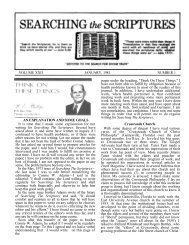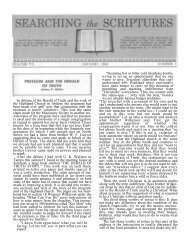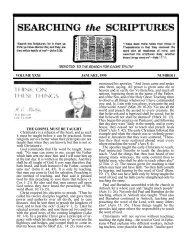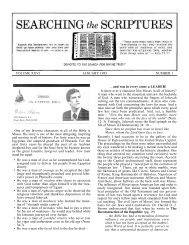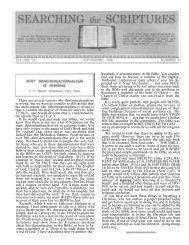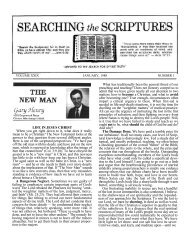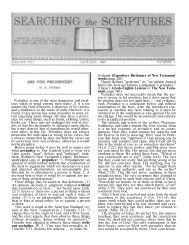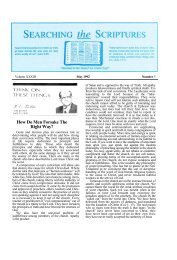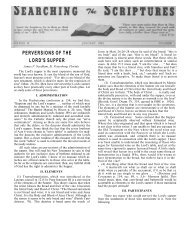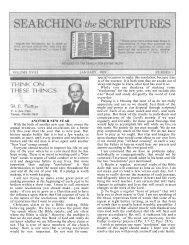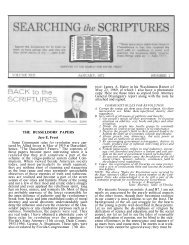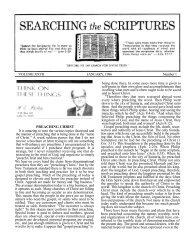Volume 21 – 1980 (PDF) - Searching The Scriptures
Volume 21 – 1980 (PDF) - Searching The Scriptures
Volume 21 – 1980 (PDF) - Searching The Scriptures
You also want an ePaper? Increase the reach of your titles
YUMPU automatically turns print PDFs into web optimized ePapers that Google loves.
Page 6<br />
JESUS OUR EXAMPLE<br />
<strong>The</strong> admonitions to follow after, emulate, or mimic<br />
Jesus are many (Mk 8:34; 1 Cor 11:1; 1 Pet 2:<strong>21</strong>,<br />
etc.). <strong>The</strong> reason for such is obvious—he was perfect!<br />
Never was there a situation for which he did not have<br />
an appropriate solution; never was there a problem<br />
for which he did not have the right answer; never was<br />
there a circumstance for which he could not<br />
recommend the very best advice.<br />
Any example is introduced for the purpose of being<br />
followed. It becomes the standard, model, mold, or<br />
illustration of something to be accomplished. In the<br />
case of Jesus, he said, "For I have given you an<br />
example, that ye should do as I have done to you."<br />
His life forms the basis for our handling the various<br />
situations we encounter as we live here.<br />
Jesus is our Example Regarding Attitude<br />
A person's attitude is his disposition, his frame of<br />
mind. <strong>The</strong> attitude of Jesus was perfect. His point of<br />
view was always of the very highest sort. In Phil 2:5,<br />
his attitude is manifestly declared and then enjoined<br />
upon us. "Have this mind in you, which was also in<br />
Christ Jesus: who existing in the form of God,<br />
counted not the being on an equality with God a<br />
thing to be grasped, but emptied himself, taking the<br />
form of a servant, being made in the likeness of men;<br />
and being found in fashion as a man, he humbled<br />
himself, becoming obedient unto death, yea, the<br />
death of the cross." Jesus is our illustration of the<br />
right attitude.<br />
His attitude toward fallen man is seen in the fact<br />
that he gave himself freely (Jno 10:17-18). Nowhere<br />
was there a source for man's salvation; nowhere was<br />
there available the purchase price for our redemption;<br />
nowhere was there a potency strong enough to<br />
furnish us with our regeneration. But Jesus Christ<br />
freely "gave himself for our sins, that he might<br />
deliver us from this present evil world ..." (Gal 1:4).<br />
It was he who, according to Paul's affirmation (Acts<br />
20: 35), taught that "it is more blessed to give than<br />
to receive." Surely such an attitude of love is worthy<br />
of our emulation!<br />
He is the prime illustration of meekness. When<br />
Jesus had washed the feet of the disciples and<br />
thereby shown his own meekness, he said, "For I<br />
have given you an example that ye should do as I<br />
have done to you" (Jno 13:15-16). Never was there a<br />
time when the Son of Man was not completely under<br />
the control of his Father (Jno 4:34). And such<br />
discipline, such control over one's own being is what<br />
meekness is all about. In every situation he did as<br />
the Father would have him do and even in the face of<br />
extremes he showed an unalterable confidence in God<br />
(Cf. Lk 22:41-42; Jno 6:38). Such meekness is not<br />
common to man naturally; it must be learned. Was<br />
there even a better standard for an attitude of<br />
meekness? I think not!<br />
His willingness to forgive is astounding! Notice the<br />
urgency he felt regarding the deliverance of mankind.<br />
"I must work the works of him that sent me while it<br />
is day; for the night cometh when no man can work"<br />
(Jno 9:4). His was a sincere compassion, an urgent<br />
concern for the spiritual welfare of the lost. See the<br />
pathos, observe his heaviness of heart, as he cries out<br />
in an exclamation of longing love, "O, Jerusalem,<br />
Jerusalem . . . how often would I have gathered thy<br />
children together even as a hen gathereth her<br />
chickens under her wings, and ye would not!" (Matt<br />
23:37). See him there on the height of Golgotha after<br />
he has suffered immense physical pain and<br />
unutterable spiritual torment, as his bloody brow<br />
furrows and he cries out to God, "Father, forgive<br />
them, for they know not what they do." Observe his<br />
outstretched arms and his longing love as he begs,<br />
"Come unto me all ye that labor and are heavy laden<br />
and I will give you rest" (Matt 11:28). We would do<br />
well to show the same compassion, the same devotion<br />
to duty, the same attitude of concern regarding<br />
forgiveness, "forbearing one another, and forgiving<br />
one another . . . even as Christ forgave you, so also<br />
do ye" (Col 3:13).<br />
Jesus Is Our Example Regarding Well-Doing<br />
Even as a child, Jesus went about doing good. In<br />
Lk. 2 is recorded the incident of his parents<br />
relocating him after fearing he was lost. In answer to<br />
their queries concerning his whereabouts, Jesus said,<br />
"How is it that ye sought me? Know ye not that I<br />
must be about my Father's Business?" He is our<br />
great example of well-doing.<br />
He was constantly teaching (Matt 4:23), and he<br />
taught not what was merely pleasing to the ear of the<br />
hearer, but what the hearer needed. He told each<br />
person, each audience what they needed to hear.<br />
When he spoke to Nicodemus, he spoke regarding his<br />
need (Jno 3: 1-ff). When conversing with the<br />
Samaritan woman at Jacob's well, he sought her<br />
spiritual welfare and even convicted her of sin (Jno<br />
4:5-ff). And when teaching the Pharisees, there never<br />
was a time when there was any evasion, but in every<br />
instance a constant reference to the truth applicable<br />
at the time. Jesus was constantly a truth teacher.<br />
And the very best thing a man can do for his fellows<br />
is to teach them the truth!<br />
It is obvious from reading the accounts of Jesus<br />
and his life as a teacher that he was a man of<br />
immense energy, totally committed to the task to be<br />
accomplished. It is easy to see that Jesus went about<br />
DOING good. Not admitting the need; not merely<br />
planning to do good; not even resolving to do<br />
so—but DOING so! He taught about doing in his



